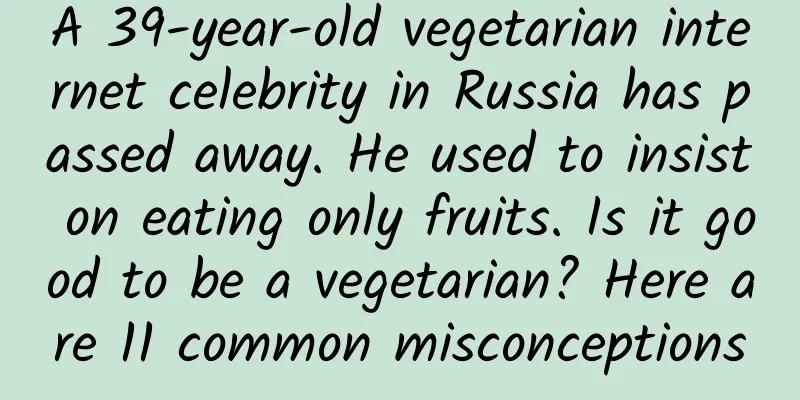A 39-year-old vegetarian internet celebrity in Russia has passed away. He used to insist on eating only fruits. Is it good to be a vegetarian? Here are 11 common misconceptions

|
According to media reports, a Russian vegetarian internet celebrity, Jenna Samsonova, who ate only raw fruits for many years, died of starvation at the age of 39. She was "exhausted by the vegan diet" and aggravated by a "cholera-like infection." The internet celebrity first gave up fish, eggs and milk to become a vegan, and then turned to a more strict vegan raw food diet, and even fruitarianism. Samsonova's family is currently waiting for a medical report and death certificate to determine her official cause of death. In recent years, eating a light diet and eating more fruits and vegetables has become a consensus for health. There are many benefits of being a vegetarian, such as lowering cholesterol, reducing the burden on the kidneys, purifying the blood, and reducing the risk of cancer. However, if you choose to eat only vegetables for three meals a day, or even blindly follow the crowd and become a vegetarian, it is likely to backfire. Long-term vegetarianism will lead to a lack of protein, vitamin B12, iron, etc. Copyrighted images from the gallery, unauthorized reproduction, please contact the original author Vegetarians are divided into two categories. The first category of vegetarians can eat eggs and drink milk, called lacto-ovo vegetarians, or vegetarians who only eat eggs and drink milk. The second category does not take any animal-related food, called vegans. Relatively speaking, it is easier for lacto-ovo vegetarians to meet their nutritional needs, and they mainly need to pay attention to iron supplementation to prevent iron deficiency anemia. For vegans, it is easier to lack more nutrients. Becoming a responsible vegetarian is not as simple as just eating vegetarian food. You must be careful to avoid the following misunderstandings: Myth 1: Thinking that vegetarians must eat raw vegetables Eating vegetables raw is not conducive to the absorption of nutrients contained in vegetables. For example, nutrients such as vitamin K and carotene in vegetables can only be well mixed with the oil components in the gastrointestinal tract and absorbed and utilized after being heated and softened. Myth 2: Vegetarians only eat fruits and vegetables Vegetarianism can be divided into strict vegetarianism, semi-vegetarianism, pescatarianism, and ovo-lacto vegetarianism. In other words, being a vegetarian does not mean not eating any meat at all, but it emphasizes a balanced diet, eating less meat and more fruits and vegetables. The principle of being a vegetarian is to stick to a light diet, but you cannot ignore your physical foundation and blindly choose a strict vegetarian diet, otherwise it will cause more adverse effects on your body. Copyrighted images from the gallery, unauthorized reproduction, please contact the original author Myth 3: Not eating enough leafy greens Vegetables have different nutritional qualities. Vegetables account for a large part of the vegetarian diet. You cannot only eat lettuce, tomatoes, white radish and the like. Try to choose some green leafy vegetables that are rich in nutrients. They are not only nutritious, but can also effectively prevent chronic diseases such as hypertension, coronary heart disease, diabetes, osteoporosis, etc. In addition, dark-colored vegetables have higher nutritional value and higher carotene content. Cruciferous vegetables are also helpful in preventing certain cancers. Myth 4: Only caring about meat and vegetables but not food processing In order to achieve a good taste, some processed foods made from plant ingredients are mainly refined white rice and flour, and are added with large amounts of sugar, oil, salt and vegetable cream, which causes the human body to consume too many calories and increases the risk of chronic diseases. Myth 5: Not controlling oil, sugar and salt in cooking In pursuit of taste, some vegetarians add a lot of oil, sugar, salt and seasonings when cooking plant ingredients. For example, some imitation meat dishes and desserts without animal ingredients actually contain quite high amounts of oil, salt, sugar and flavor enhancers, and the original health effects of plant foods have been completely lost. Copyrighted images from the gallery, unauthorized reproduction, please contact the original author Myth 6: Eat a lot of fruit and then continue to eat a lot of staple food Many vegetarians like the sweet and sour taste of fruits and think that they are healthy, so they eat as much as they want. However, when eating fruits, one should not ignore the more than 8% sugar in them and should avoid excess energy by eating less staple food. If you eat too much fruit and also take in too much staple food, which exceeds your body's needs, it will be converted into triglycerides and stored in your body. If things go on like this for a long time, high blood lipids are inevitable. Myth 7: Eating only refined white staple foods without any whole grains or beans Refined white rice and flour contain very little nutrients. If you don't eat meat, your body's intake of B vitamins will be reduced, which is not good for your health. To effectively increase the supply of B vitamins, you need to replace most of your staple food with whole grains and beans. Beans contain a lot of protein, about three times the content of rice, which can effectively increase the supply of plant protein. Myth 8: The amount of milk, eggs, beans or soy products has not increased The human body can obtain the protein, calcium, B vitamins and vitamin AD needed by the human body from milk, eggs and soy products. Especially for people who do not eat fish, insufficient intake can easily lead to malnutrition. Vegetarians who can tolerate eggs and milk can consider increasing their intake. Vegans should pay more attention to supplementing with protein powder or protein-fortified foods. Copyrighted images from the gallery, unauthorized reproduction, please contact the original author Myth 9: Not eating nuts and oilseeds every day Related studies have shown that nuts and oilseeds are very beneficial to vegetarians. They are rich in trace elements and vitamin E, can increase satiety and dietary satisfaction, and also help control blood lipids and prevent coronary heart disease. They are the source of a variety of health ingredients such as plant sterols, lecithin, and polyphenols. Myth 10: Not paying attention to the supplementation of other nutrients Plant-based foods contain a variety of anti-nutrients that hinder food digestion and absorption, and have high gastrointestinal function requirements. Therefore, switching to a vegetarian diet will lead to a decrease in the absorption rate of trace elements in the human body. A simple and effective option is to take appropriate complex nutrients, supplement trace elements and multivitamins. Vegetarians cannot take DHA and EPA, especially vegetarian expectant mothers and breastfeeding women, so they need to supplement some linolenic acid or take DHA preparations directly. In addition, omega-3 polyunsaturated fatty acids are more abundant in fish and seafood, and vegetarians often do not supplement them enough. Long-term deficiency can cause symptoms such as skin inflammation. For vegetarians, they need to eat more seafood such as kelp, or take omega-3 supplements in a planned way. Vitamin B1, B2, B6, etc. are abundant in milk, eggs, meat, and fish. In addition, a moderate intake of fermented products can help supplement vitamin B12 (bean fermented products include bean paste, soy sauce, fermented black beans, and fermented bean curd), and the utilization rate of iron and zinc is also relatively high. B vitamins are involved in regulating sugar and lipid metabolism, prompting them to be converted into calories for consumption. If vegetarians lack B vitamins in their bodies, sugar and lipid metabolism disorders will cause a series of health problems. Whether you are a vegetarian or a meat eater, you should not be extreme. You should eat reasonably and live a healthy life according to your own needs. A balanced diet is the key. Sources: "Is vegetarianism a trend? These groups of people should be cautious when choosing to be vegetarian" People's Daily Online "Is a vegan diet really healthy?" Science Popularization China - Green Dual Carbon |
Recommend
Mantu Xiaoke | Xinjiang Robin - a bird with a "heavenly voice"
In 2024, the Xinjiang Association for Science and...
Scientists' treasure trove of "ledgers" helps forests record carbon balances
As a carbon sequestering superman, the forest eco...
Hiss! Burned by the hot pack again? We did an experiment to reveal the truth about the burns caused by the hot pack!
Every winter, we always see a lot of news about p...
At a cost of $10 billion, a 40-year-old problem remains unsolved
As physicists face three decades of fruitless sea...
Automating the building of Android and iOS apps with Jenkins
background As business needs evolve, the complexi...
"In the wild, I think of myself as a man"! In the Chinese Academy of Sciences, there is such a "her" force
Author: Chen Huanhuan Cai Yuanpei once said in a ...
How do we achieve rocket sharing when launching multiple satellites into space?
In a blink of an eye, 2023 is drawing to a close,...
Why does my phone automatically remind me when the battery level is below 20%?
The "greatest pain" in life is that you...
Dongfeng Honda recalls more than 80,000 vehicles due to minor problems with electric rearview mirrors
Automobile recalls due to quality issues are beco...
Offline marketing promotion methods for educational training institutions
If educational training institutions want to obta...
ASO optimization: the main factors affecting ASO, key points of optimization at the APP product level!
As of April this year, the total number of applic...
Weibo advertising creative optimization skills, placement and traffic generation
I believe most advertisers are very familiar with...
How to promote and attract new users during the cold start phase of APP?
As the threshold for APP development is lowered, ...
If you are more afraid of heat than the people around you, you should check your thyroid gland!
How hard is summer? Taking one more step outside ...









